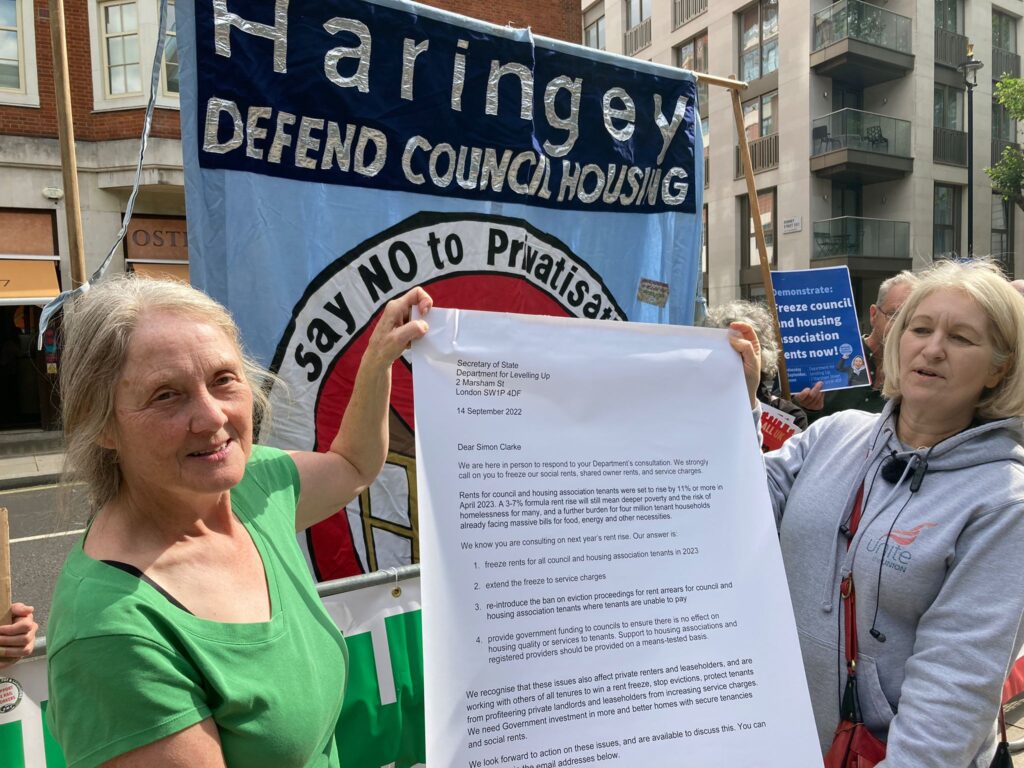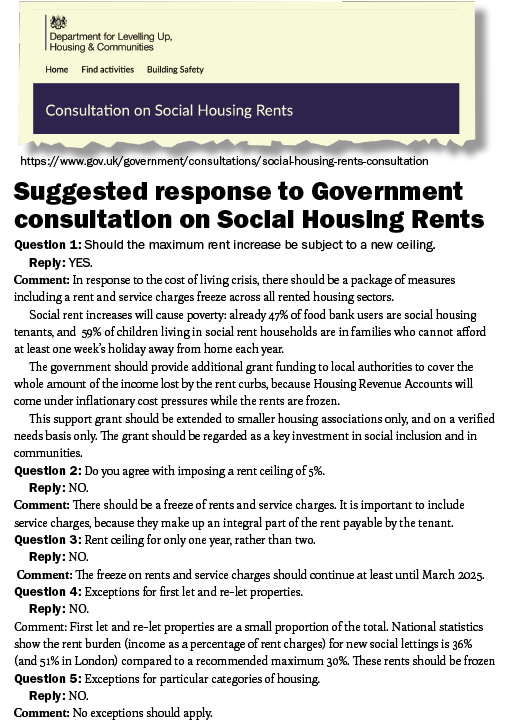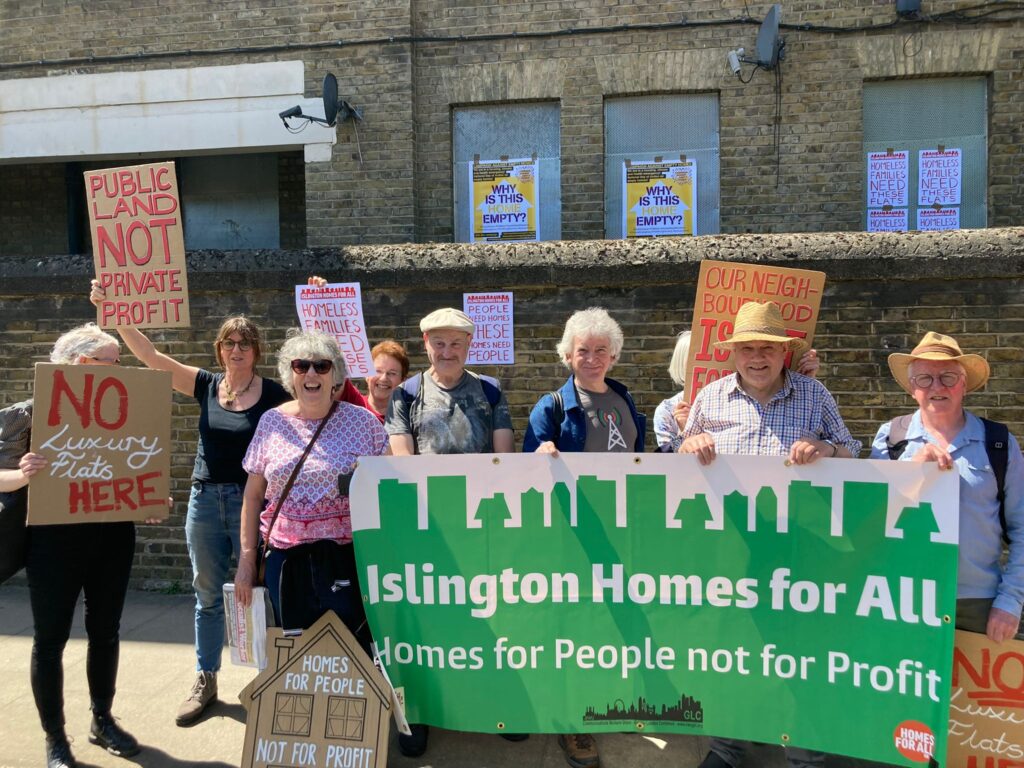23 July 2022
A raft of new government housing policies are facing two different ways: towards greater marketisation, and towards better rights and protections for tenants. There will be some important struggles as to which of these tendencies will win out.
First, the bad news
The proposals in Boris Johnson’s housing speech of 9 June proposals (right to buy for housing association tenants, and conversion of rent to mortgage for those on state benefit) are a cynical reversion to the rhetoric of marketisation.
They offer nothing at all to address the housing needs of the poorest, for whom a right to buy extension would make things much worse.
There are plenty of practical difficulties with the proposals. A government enacted right to buy of private property is legally and practically problematic. The right to buy extension is backed by a promise of Treasury funding, but it would be expensive. There is a promise of 100% like for like replacement, even though there was a pilot for the scheme which showed that only half of the homes were replaced, and the replacements were more expensive and inferior in standard to the ones that were sold. Replacement promises for local government right to buy have always been broken.
Many housing association finance managers might welcome right to buy, as they would lose social rent stock and most likely receive cash in compensation with little effective control over how it is spent. Local authority right to buy (introduced in 1980) began a massive shrinkage of the social housing stock, and this new policy means that the government would consider extending the shrinkage all over again. The government promises a tight restriction on the number of homes to be sold, and a national waiting list to buy, but the option for shrinkage is very much there.
In the parliamentary debate on social housing (which was also held on 9 June) and in media responses and interviews the Labour party did not oppose the Tories’ proposals in principle, and nor did they mention Johnson. They made some good criticisms of the detail, but there was much that remained unsaid. There was no criticism of the influence of property developers over housing policy, the oversupply of unaffordable housing, the Shelter report ‘Building for our future: A vision for social housing’ which shows that a mass social rent housebuilding programme would pay for itself in benefit savings and savings in the other costs of social exclusion.
There is a tendency to call for more social rent housing, but without the specified numbers and the funding that would define an effective policy (100,000 new council homes a year, and £10 billion a year in grant funding), ‘more social rent housing’ is meaningless.
The Labour leadership clearly believe that they cannot be seen to oppose any proposals that are packaged as home ownership, and they are reluctant to oppose right to buy in any form. They are not prepared to speak the worth and value of council housing or social rent housing, as an alternative to the present policy of excessive government financial support for ownership. They are ignoring the excellent motion passed at last year’s party conference to support the contents of the 2019 election manifesto on housing, including 100,000 new council homes a year, and abolishing the right to buy.
Shadow Secretary of State Lisa Nandy went further on 2 May when Johnson first broached the new plans for extended right to buy, tweeting ‘Every family deserves the security of owning their own home. This won’t deliver that. Labour will.’
The proposed conversion of rent to mortgage for those on state benefit is restricted to those in work and claiming housing benefits. It is not at all clear how this might work. But it is potentially an even more dangerous policy than the right to buy extension. It is reminiscent of mass privatisations elsewhere in the world, where public sector homes were simply given away to tenants, without proper concern for sustainability. The government is not in a position to do anything rapidly on that scale, but they are carrying out a full-scale review of the mortgage market to find ways to make it easier for younger people to buy. Of course that is fine, if it was to be done without losing the social rent homes, but instead the review seems to be linked to the right to buy extension and the housing benefit to mortgage schemes.
And now, the better news
On 16 June, we had the opposite face of government policy, with the publication of the white paper on their proposed renters reform bill. This promises the abolition of Section 21 ‘no fault’ eviction notices, and the extension of the Decent Homes Standard to the private rented sector. This is a major reform project, changing decades of policies by successive governments which have moved away from security of tenure, and have left the private rented sector without any proper regulation. As if that is not enough, there is also a benefit for social rent tenants, again undoing decades of policy creep: ‘probationary, fixed-term and demoted social tenancies are now set to be abolished on the grounds that there should be parity between sectors’.
These reforms of the private rented sector could be partly nullified without rent control. So the case for rent control is being opened up here. The proposed reforms show that protest works, and that the power of property ownership and the agenda of reducing tenants’ rights can all be challenged. These two government policies are in total contradiction with one another. It is possible that the private renters reforms could be stopped by an internal revolt within the Conservative Party. It is worrying that the battle seems to be conducted mostly covertly and within the Conservative Party. By not opposing any policy badged as ownership, however damaging it may be, Labour would put itself on the wrong side of this debate. It may be argued that the housing crisis with its continued rise of private renting (insecure, low quality, and poor value for money) is tending to create an increasingly coherent voting base for the Labour Party. Hence the Tories, who would like to see private rent as the working class tenure of the future for those who cannot afford owner occupation, have strong incentives to carry through some serious, but necessarily limited reforms to the sector.
Tenants, residents and housing campaigners must campaign and struggle for a consistent policy to build (or buy) new environmentally sustainable council housing, to restrict developer influence and restrict excessive market housebuilding, while controlling rents and improving residents’ rights across all tenures. The contradictions of the new government policies show that such a campaign could win the day.
Here is Lisa Nandy’s tweet:
See Jules Birch, ‘Can the government deliver on fairer rent?’, Inside Housing 17 June: https://www.insidehousing.co.uk/comment/can-the-government-deliver-on-fairer-rent (behind paywall – but you can copy the article title into a search engine to read it).
Hansard report of the House of Commons debate on 9 June:
https://hansard.parliament.uk/Commons/2022-06-09/debates/3AC0E458-8C3F-4846-84AC-17F7BD03CB20/SocialHousingAndBuildingSafety
The White Paper, ‘a fairer private rented sector’: https://assets.publishing.service.gov.uk/government/uploads/system/uploads/attachment_data/file/1083378/A_fairer_private_rented_sector_web_accessible.pdf
Thanks to Paul Burnham, Haringey DCH









